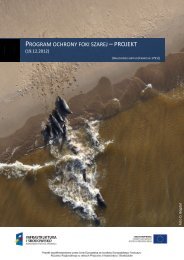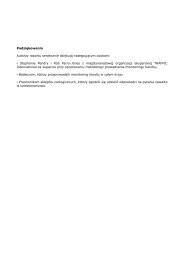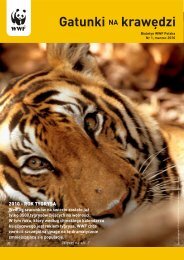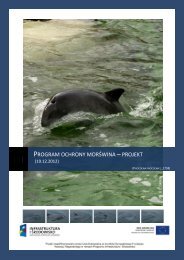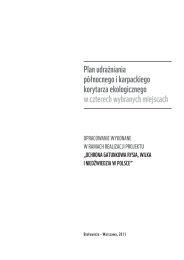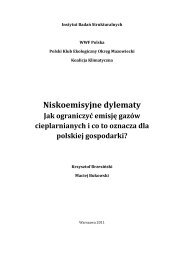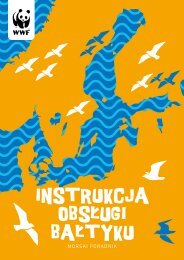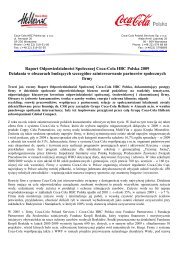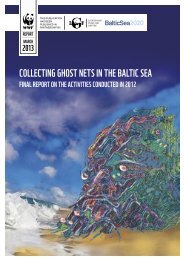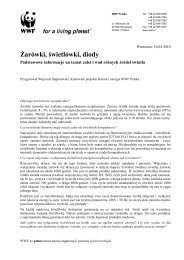Biodiversity, biocapacity and better choices
Biodiversity, biocapacity and better choices
Biodiversity, biocapacity and better choices
You also want an ePaper? Increase the reach of your titles
YUMPU automatically turns print PDFs into web optimized ePapers that Google loves.
Equitable resourcegovernanceEquitable resource governance is the second essential enablingcondition to shrink <strong>and</strong> share our resource use to stay withinthe regenerative capacity of one planet. In addition to efforts toreduce the footprint of high-income populations (see “Consumemore wisely” section), we must also improve health <strong>and</strong> educationst<strong>and</strong>ards, <strong>and</strong> create viable economic development plans. Thesemust exist within legal <strong>and</strong> policy frameworks that provide equitableaccess to food, water <strong>and</strong> energy, <strong>and</strong> be supported by inclusiveprocesses for sustainably managed l<strong>and</strong> use. Equitable resourcegovernance also requires a changed definition of well-being <strong>and</strong>success that includes personal, societal <strong>and</strong> environmental health.Cities as solution hot spots for aOne Planet economyWhile political gridlock may stop rational action elsewhere,leading cities are already realizing the shared benefits of footprintreduction, social well-being <strong>and</strong> economic resilience. WWF’sEarth Hour City Challenge invites cities to inspire the world withtheir plans for moving towards a 100% renewable economy <strong>and</strong>supporting One Planet Lifestyles. Whereas Earth Hour channelsthe public’s impatient calls for global political action, the EarthHour City Challenge helps local governments realize the social,economic <strong>and</strong> ecological benefits of developing One Planetsolutions (for housing, energy, mobility, food, etc.) togetherwith their citizens <strong>and</strong> businesses. City Challenge c<strong>and</strong>idatesare supported to report their performance, commitments <strong>and</strong>action plans. Public participation is promoted <strong>and</strong> best practicefrom finalist cities in all countries is documented <strong>and</strong> sharedinternationally. An international jury of experts awards the cityundertaking the most inspiring, ambitious <strong>and</strong> credible actions“Earth Hour Capital of the year”.For more information: http://www.earthhour.org/Equitable resourcegovernance is ANessential enablingcondition to shrink<strong>and</strong> share ourresource useInvestmentin energyefficient urbaninfrastructure<strong>and</strong> ecosystemservices is essentialto ensure food,water <strong>and</strong> energysecurity forbillions of peoplexiii. Share available resources• Implement natural resource governance built on inclusiveprocesses <strong>and</strong> broad participation by communities dependenton natural resources.• Minimize the footprint of high-income populations <strong>and</strong> urbanareas (see “Consume more wisely”).• Promote the transition toward sustainable, resource-efficientcities <strong>and</strong> reduce the direct impact of cities on water <strong>and</strong> l<strong>and</strong>by limiting urban sprawl, promoting urban agriculture <strong>and</strong>sustainable waste (water) management.xiv. Make fair <strong>and</strong> ecologically informed <strong>choices</strong>• Implement policies <strong>and</strong> tools for analysing, resolving <strong>and</strong>managing competing l<strong>and</strong> use <strong>and</strong> water use claims.xv. Measure success “beyond GDP”• Include social <strong>and</strong> environmental indices in national indicatorsto measure <strong>and</strong> reward success.• Implement economic policies with targets <strong>and</strong> indicators tomonitor the impact of economic governance on natural capital<strong>and</strong> human well-being.xvi. Sustainable population• Explicitly integrate population dynamics (size, growthrate, composition, location <strong>and</strong> migration) <strong>and</strong> per capitaconsumption trends into national planning policies to support a<strong>better</strong> balance between population <strong>and</strong> available resources.• Ensure universal access to gender-sensitive reproductive healthservices <strong>and</strong> information, reduce child mortality <strong>and</strong> supportthe empowerment of women <strong>and</strong> young girls through greateraccess to higher education <strong>and</strong> employment opportunities.WWF Living Planet Report 2012 page 120 Chapter 4: Better <strong>choices</strong> for a living planet page 121



